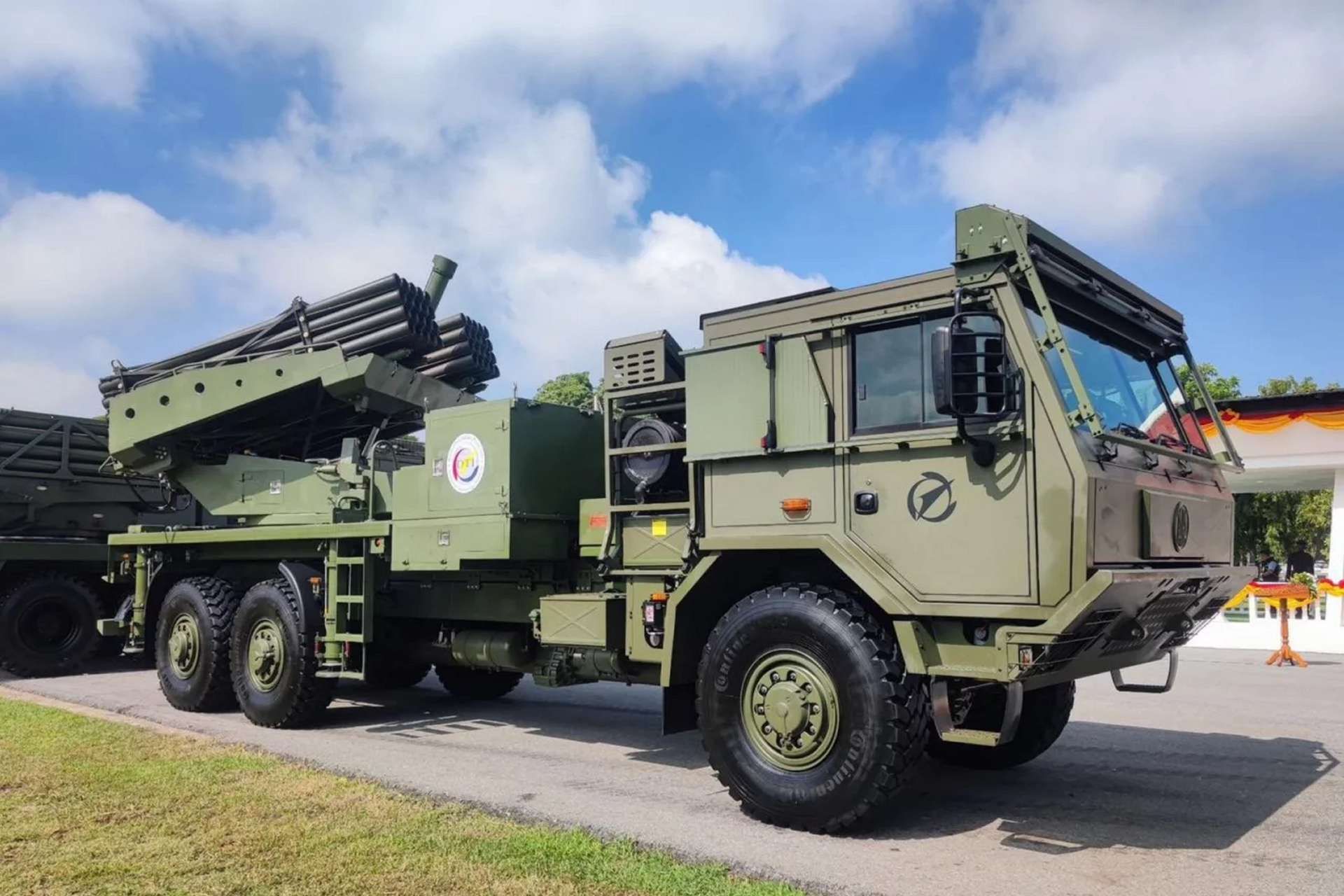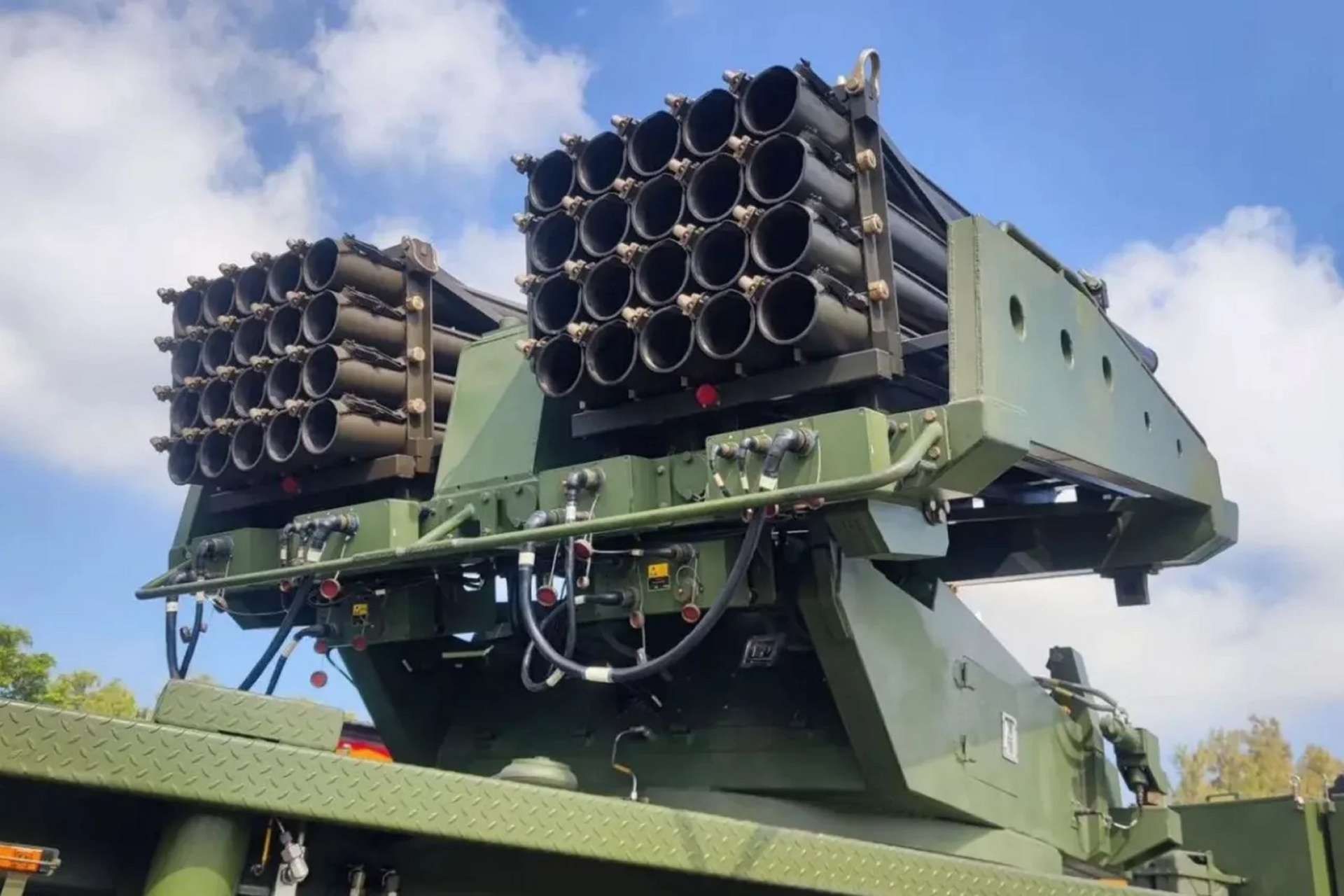Breaking News
Royal Thai Army Evaluates D11A MLRS Inspired by Israel's PULS System.
The Defense Technology Institute of Thailand (DTI) and the Royal Thai Army (RTA) conducted a series of tests and evaluations of the prototype of the D11A multi-purpose multiple rocket launcher from September 4 to 6, 2024. These tests, held at the Army’s Transportation Department’s vehicle training and testing range in Kanchanaburi Province, mark a crucial step in the development of this weapons system.
Follow Army Recognition on Google News at this link

This modular launcher system supports a wide range of rockets, including unguided 122mm rockets such as the Russian GRAD, the Thai-developed DTI-2, and Chinese SHE-30 and SHE-40 rockets. (Picture source: Thailand's Defence Technology Institute)
The D11A is the result of a joint project between DTI and the RTA. It was delivered to the 711th Artillery Battalion, based at Fort Bhumibhol in Lopburi Province, on August 9, 2024. This multiple rocket launcher, mounted on a Tatra 6x6 truck of Czech design, is a Thai version of the Israeli PULS (Precise and Universal Launching System) developed by Elbit Systems. Capable of switching rocket pods in less than 10 minutes, it offers a firing range between 40 and 300 kilometers, with compatibility for Russian GRAD rockets as well as Chinese SHE-30 and SHE-40 models already in service with the Thai Army.
The tests conducted in September represent a significant milestone, which will be reviewed by the RTA's Evaluation Committee to determine the feasibility of serial production of the D11A. The next steps will include live-fire testing of surface-to-surface missiles at the Khao Phulon Artillery Range, also located in Lopburi Province. The initial trials will involve 122 mm Accular guided missiles, with an effective range of 40 km.
The D11A system is mounted on a 10-ton Tatra 6x6 truck chassis from the Czech Republic. This modular launcher system supports a wide range of rockets, including unguided 122mm rockets such as the Russian GRAD, the Thai-developed DTI-2, and Chinese SHE-30 and SHE-40 rockets. The system is designed for rapid pod changes—within 10 minutes—and offers performance similar to the GRAD in terms of speed and range. It is capable of firing both individual rounds and volleys, covering up to 3 hectares in a single volley of 40 rockets with high explosive fragmentation shells.
Additionally, the D11A can accommodate guided 122mm Accular missiles, which are set to undergo live-fire testing later in 2024 at the Khao Phulon Artillery Range. The Accular missiles, developed by Elbit Systems, offer an effective range of 40 kilometers with high accuracy, featuring a Circular Error Probable (CEP) of 10 meters.
In addition to the 122mm rocket trials, the D11A system will also be tested with 306mm EXTRA missiles, offering a range of 150 km, and 370mm Predator Hawk missiles, which can reach targets up to 300 km away. If successful, these tests would pave the way for local production of the launcher, significantly enhancing the Thai artillery’s capabilities.
The D11A project began in 2019 with a development contract worth USD 2.2 million awarded to Elbit Systems and was initially unveiled at the Defense & Security 2022 show in Bangkok. Despite delays caused by the COVID-19 pandemic, development resumed in early 2022. The system is designed to meet Thailand’s coastal artillery requirements and was developed in collaboration with the Royal Thai Navy’s Naval Research and Development Office.
As part of its effort to enhance its artillery capabilities, the Royal Thai Army recently approved the purchase of 563 SHE-30 rockets for 160 million baht (around USD 4.75 million) and 505 SHE-40 rockets for 151 million baht (around USD 4.5 million). These acquisitions from the Chinese arms company NORINCO aim to enhance the Army’s rocket stockpile, maximizing the D11A's potential with existing systems.
Elbit Systems, DTI’s Israeli partner for this project, has also proposed the integration of SkyStriker autonomous loitering munitions, which could be fired from the D11A. If this technology is adopted, it would provide the Royal Thai Army with enhanced precision strike capabilities and strategic flexibility, particularly in modern warfare environments where autonomous weapons systems play an increasingly important role.
The success of these ongoing trials could strengthen Thailand’s position as a developer of defense technologies, while diversifying the operational capabilities of its armed forces. The D11A project, with its multiple applications and munitions options, represents a significant advancement for Thai artillery and could open the door to future international defense collaborations.

D11A Multi-purpose Multiple Rocket Launcher Vehicle (Picture source: Thailand's Defence Technology Institute)


























